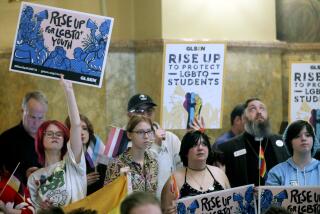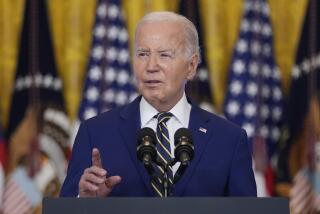U.S. Judge Rejects Militaryâs Policy on Treatment of Gays : Courts: N.Y. ruling in case of six service members cites free-speech, equal-protection violations. Decision puts the âdonât ask, donât tellâ directives in jeopardy.
NEW YORK â A federal judge Thursday struck down as unconstitutional the governmentâs âdonât ask, donât tellâ policy that allows gay men and lesbians to serve in the military only if they keep their sexual orientation to themselves.
Ruling in the case of six homosexual service members, U.S. District Judge Eugene H. Nickerson of Brooklyn held that the controversial policy violated their rights to free speech and equal protection under the law.
He ordered the Defense Department to stop enforcing its year-old policy against the six service members--a ruling that throws into grave doubt guidelines Congress and the Clinton Administration had hoped would provide equal treatment for homosexuals and heterosexuals in the military.
The judge also took particular aim at the Pentagonâs argument that allowing gay men and lesbians to serve in uniform will disrupt troop cohesiveness and morale. Rather, he concluded, the opposite occurs when any enlisted man or woman keeps secrets from comrades.
âIf there is one thing that is undisputed and seems self-evident, it is that cohesion depends on mutual trust within the unit,â the judge wrote.
âThe honor code for service members provides that they will not lie or cheat and for good reason. Honesty is a quality that attracts respect. Secrecy and deception invite suspicion, which in turn erodes trust, the rock on which cohesion is built.â
Nickerson described the policy as ânothing short of Orwellianâ because it equates sexual orientation with misconduct.
âTo presume from a personâs status that he or she will commit undesirable acts is an extreme measure,â he said. âHitler taught the world what could happen when the government began to target people not for what they had done but because of their status.â
Gay and lesbian organizations and the American Civil Liberties Union, whose legal defense brought the lawsuit challenging the governmentâs policy, hailed the ruling as a breakthrough for fairness for the entire military community. They noted that, while the judgeâs ruling applies only to the six plaintiffs in the Brooklyn case, it is likely to affect profoundly future cases in the militaryâs disciplinary system.
âOur victory today is enormously gratifying,â said Matthew Coles, who as director of the ACLUâs National Lesbian and Gay Rights Project was the lead attorney for the plaintiffs.
But, he added: âWe must remember that there are tens of thousands, if not hundreds of thousands, of lesbian and gay service members who are still at risk.â
*
The Pentagon appeared undaunted after learning of the ruling. Defense officials asked the Justice Department to appeal the decision.
âWe believe our policy is constitutional and we intend to defend the policy,â said Ken Bacon, chief spokesman for the Department of Defense.
âWe investigate every charge we get about unfair application of the policy and we have not found that the policy has been applied unevenly or unfairly. It seems to be working very well from the standpoint of the commanders. That has been our experience and it remains our experience.â
Added Sen. Strom Thurmond (R-S.C.), chairman of the Senate Armed Services Committee: âI believe the âdonât ask, donât tellâ policy is essential to fostering high morale and discipline within the armed forces. . . . The legislation was needed and appropriate.â
The case before Nickerson was the first direct challenge to the new policy. He issued his ruling after three days of testimony and oral arguments, in which none of the six homosexual service members testified.
All but one of them have disclosed their sexual orientation publicly and have come under various phases of the militaryâs disciplinary system for doing so. They are 1st Lt. Kenneth Osborn and Lt. Richard von Wohld, both of the Army Reserves in California; Navy Petty Officer Robert Heigl of New York; Army Reserve Sgt. Stephen Spencer of Washington State; and Navy Seaman Werner Zehr of Florida.
The sixth plaintiff was identified only with a pseudonym of âJane Able,â an Army Reserve lieutenant colonel based on the West Coast with more than 20 years of service.
All have been instructed by their attorneys not to discuss the case until all appeals have been exhausted.
âThe government will probably file an appeal and it will go up to the next court,â said Kathy Parrent, a spokeswoman in the ACLUâs office in New York. âIf we lose anywhere along the way, the government can take away their rights to serve in the military. In other words, they can kick them out.â
Several experts, including two retired generals, testified on behalf of the plaintiffs during the short trial this month.
In contrast, the government offered no witnesses but instead simply asked the judge to rely on testimony from congressional hearings in 1993 that went into crafting the policy.
President Clinton pledged in his 1992 campaign to do away with the ban against homosexuals in the service.
But after taking office, he ran into considerable opposition on Capitol Hill and from the military.
Eventually, a compromise was drawn. Military commanders were told âdonât askâ about an individualâs sexual preference and individuals were instructed âdonât tell.â The new directives went into place in February, 1994.
At the heart of the earlier congressional testimony were strong assertions that unit cohesion would be severely compromised. Military leaders said it was important for heterosexual enlistees to be able to assume that all of their comrades in living, showering and sleeping quarters were of the same sexual orientation.
*
But the judge, who was appointed by President Jimmy Carter in 1977, seized on that very argument, turned it around, and said that it was more damaging if enlistees did not know.
âThis heterosexual animosity toward homosexuals is based on irrational prejudices,â the judge said.
He used an example of enlistees using the same showers and stated that âhomosexuals who wish to peek at naked bodiesâ will do so regardless of whether orientation is publicly known.
âThe only difference will be that heterosexuals will not know which of their service mates are homosexuals,â the judge said.
He added that heterosexuals will never believe anyway that the secrecy policy makes their individual units free of homosexuals.
Heterosexual members of the armed services âare not dunces or ostriches,â he said.
(BEGIN TEXT OF INFOBOX / INFOGRAPHIC)
Excerpts From Ruling
Excerpts from ruling declaring the Clinton Administrationâs policy on gays in the military unconstitutional:
âCommon sense suggests that a policy of secrecy, indeed what might be called a policy of deception or dishonesty, will call unit cohesion into question.â
âCongress may not enact discriminatory legislation because it desires to insulate heterosexual service members from statements that might excite prejudices.â
âHeterosexuals and homosexuals alike would be entitled to think it demeaning and unworthy of a great nation to base a policy on pretense rather than on truth.â
âThis court concludes that under the First Amendment a mere statement of homosexual orientation is not sufficient proof of intent to commit acts as to justify the initiation of discharge proceedings.â
More to Read
Sign up for Essential California
The most important California stories and recommendations in your inbox every morning.
You may occasionally receive promotional content from the Los Angeles Times.











